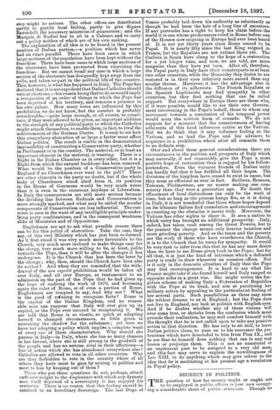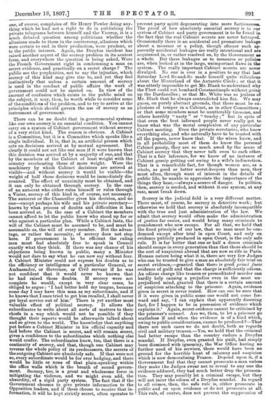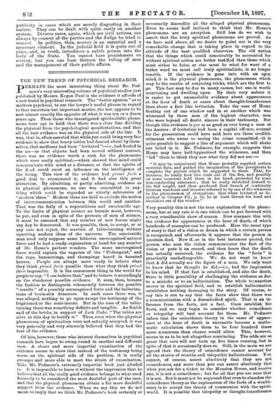SECRECY IN POLITICS.
THE question of how far secrecy ought or ought not to be employed in public affairs is just now occupy- ing a considerable share of public attenizon. Though no one, of course, complains of Sir Henry Fowler doing any- thing which he had not a right to do in publishing the private telegrams between himself and the Viceroy, it is a much debated question among politicians whether the allusions made to them in the controversy, allusions which were certain to end in their production, were prudent, or to the public interest. Again, the Dreyfus incident has raised another aspect of the secrecy problem in its acutest form, and everywhere the question is being asked, Were the French Government right in condemning a man on secret evidence, and practically on a secret charge ? The public see the perplexities, not to say the injustice, which secrecy of this kind may give rise to, and yet they feel instinctively that unless a certain amount of secrecy is used in the conduct of public affairs the work of government could not be carried on. In view of the amount of confusion which exists in the public mind on the subject, it may, then, be worth while to consider some of the conditions of the problem, and to try to arrive at the principles which should govern the use of secrecy as an instrument of government.
There can be no doubt that in governmental systems like our own secrecy is an essential condition. You cannot carry on a system of Cabinet government without secrecy of a very strict kind. The reason is obvious. A Cabinet is a Committee, but it is a Committee which speaks like a single individual. It is, that is, an artificial person which acts on decisions arrived at by mutual agreement. But clearly it could not act like one man if it were known that this decision was arrived at by a majority of one, and that by the members of the Cabinet of least weight with the country overbearing those of more weight. Were the machinery by which Cabinet decisions are arrived at visible—and without secrecy it would be visible—the weight of half those decisions would be immediately dis- counted. The effect of unanimity must be obtained, and it can only be obtained through secrecy. In the case of an autocrat who either rules himself or rules through a Vizier, secrecy of this kind is, of course, not necessary. The autocrat or the Chancellor gives his decision, and no one—except perhaps his wife and his private secretary— knows by what process of doubts and difficulties it has been arrived at. In the case of a Cabinet the members cannot afford to let the public know who stood up for or who against a particular plan. While a Cabinet lasts, the will of the Cabinet must be assumed to be, and must be assumable as, the will of every member. But the advan- tage, or rather the necessity, of secrecy does not stop here. If government is to be efficient the ruling men must feel absolutely free to speak in Council exactly what they think. If there was any chance of his objections being known in public, many a Minister would not dare to say what he can now say without fear. A Cabinet Minister could not express his doubts as to the efficiency or intelligence of a particular General, or Ambassador, or Governor, or Civil servant if he was not confident that it would never be known that he had raised those doubts. If secrecy were not complete he would, except in very clear cases, be obliged to argue : had better hold my tongue, because some day I may have this man as my subordinate, and if he knows that I once tried to get him recalled, I shall never get loyal service out of him.' There is yet another most valuable effect of political secrecy. It allows the subordinates to write about all sorts of matters to their chiefs in a way which would not be possible if they thought their reports would be afterwards talked about and so given to the world. The knowledge that anything put before a Cabinet Minister in his official capacity and laid before the Cabinet is secret, and will remain secret, gives a confidence to the subordinates which nothing else would confer. The subordinates know, too, that there is a continuity of secrecy, and that, though one Cabinet may reverse the whole policy of its predecessors, the secrets of the outgoing Cabinet are absolutely safe. If that were not so, every subordinate would be for ever hedging, and there would be little or none of that plain-speaking within the office walls which is the breath of sound govern- ment. Secrecy, too, is a great and wholesome force in mitigating the violence, and we might even add, the absurdity, of a rigid party system. The fact that if the Government chooses to give private information to the Opposition leaders, and if these choose to receive that in- formation, it will be kept strictly secret, often operates to prevent party spirit degenerating into mere factiousness. The proof of how absolutely essential secrecy is to our system of Cabinet and party government is to be found in the fact that the real Cabinet secrets are never betrayed. Occasionally there is an accidental and premature leakage about a measure or a policy, though oftener such ap- parently accidental leakages are really intentional and are acquiesced in, or rather resolved on, by the Government as a whole. But these leakages as to measures or policies are, when looked at in the large, unimportant flaws in the system. The really important Cabinet secrets are never divulged. No one is ever in a position to say that last Saturday Lord So-and-So made himself quite ridiculous about the Hinterland of the Antarctic Circle ; or that it was utterly impossible to get Mr. Blank to understand why the Fleet could not bombard Constantinople without going up the Dardanelles ; or that Mr. White was so jealous of Mr. Black that he always contradicted him flat. We may guess, on purely abstract grounds, that there must be ex- plosions of temper in a Cabinet, as in other Committees ; or that some members must be unutterably tiresome, and others horribly " nasty " or "touchy ; '4 but in spite of that even the best informed people never really get to know what was the moral complexion of any particular Cabinet meeting. Even the private secretaries, who know everything else, and who naturally have to be trusted with all the papers, never know that. If the wives know, and in all probability most of them do know the personal Cabinet gossip, they are so much awed by the sense of Cabinet secrecy that they never talk even to each other. That is a fair inference, for we know of no instance of Cabinet gossip getting out owing to a wife's indiscretion. That is a remarkable fact, for though women are, as a whole, as good or better secret-keepers than men, they must often, through want of interest in the details of public life, be unable to appreciate the importance of the things they hear,—always a source of danger. In politics, then, secrecy is needed, and without it our system, at any rate, must break down.
Secrecy in the judicial field is a very different matter. There must, of course, be secrecy in detective work ; but otherwise we hold that secrecy is absolutely incompatible with the true and just administration of the law. We admit that secrecy would often make the administration of justice far easier, and would bring many criminals to punishment who now escape. For all that, we hold that the fixed principle of our law, that no man must be con- demned except after trial in open Court, and only on evidence publicly produced in open Court, is the only safe rule. It is far better that one or half a dozen criminals should escape in every generation than that there should be the sort of suspicions abroad that are now so rife in Paris. Human nature being what it is, there are very few Judges who can be trusted to give a man an absolutely fair trial on secret evidence,—granted that there is good prima facie evidence of guilt and that the charge is sufficiently odious. An odious charge like treason or premeditated murder can hardly help causing a prejudice even in the most un- prejudiced mind, granted that there is a certain amount of suspicion attaching to the prisoner. Again, evidence given in secret is never tested. How can one be sure that if it were given in public some one would not come for- ward and say, 'I can explain that apparently damning fact, for I happen to be in possession of evidence which explains it.' Again, secret evidence cannot be criticised by the prisoner's counsel. Are we, then, to let a prisoner go scatheless if and when the evidence is of a kind which, owing to public considerations, cannot be produced ?--That there are such cases we do not doubt, both as regards civil and military treason.—Yes, we hold that the criminal had better escape than the country endure a Dreyfus scandal. If Dreyfus, even granted his guilt, had simply been dismissed with ignominy, the War Office having no further need of his services, there would have been no ground for the horrible hunt of calumny and suspicion which is now demoralising France. Depend upon it, if a. Government feel that they cannot prosecute a man unless they make the Judges swear not to reveal to any one the evidence adduced, they had much better drop the prosecu- tion. They may possibly let a criminal escape, but they will not incur the odium of a Dreyfus scandal. In regard to all crimes, then, the safe rule is, either prosecute in public and on open evidence or do not prosecute at all. This rule, of course, does not prevent the suppression of
publicity in cases which are merely disgusting in their nature. They can be dealt with quite easily on another system. Divorce cases, again, which are civil actions, can always by consent of the parties and the Judge be tried in camer(i. In politics, then, secrecy is an essential and a necessary element. In the judicial field it is quite out of place, and, in truth, introduces a subtle poison into the body of the State. You cannot base punishment on secrecy, but you can base thereon the ruling of men and the management of their public affairs.








































 Previous page
Previous page